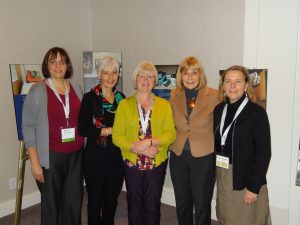Our team presented at the Qualitative Health Research Conference in Victoria, BC. The symposium began with a an arts-based presentation that shared people’s experiences of living with life threatening illness, followed by exploring metaphors of HIV and ended with some of considerations for knowledge translation.
Exploring Narrative Analyses and Dissemination: Re-stor(y)ing Life within Life-threatening Illness
Symposium
Chair:Anita Molzahn,
Introduction: Increasing numbers of people with serious illness live in-between the promise of treatment and the threat of recurrence or progression of disease and yet this experience is not well understood. A better understanding of these liminal experiences is important for developing meaningful supports and resources to improve quality of life for people living with cancer, end-stage renal disease and HIV. This symposium will focus on mixed analytic and dissemination approaches within narrative inquiry. Drawing on findings from a narrative study exploring how people living with life-threatening illness story and re-stor(y) their lives, the symposium will present: 1) narratives of keeping secrets using métissage; 2) describe how metaphor may illuminate stories of aging with HIV; and 3) explore the space between data analysis and Abstract, Symposium 575 dissemination using an array of knowledge translation strategies. Creative and innovative analytic and dissemination strategies to share stories of living with life-threatening illness will be discussed.
Presentation #1: Keeping Secrets: A Métissage of Living with Life-Threatening Illness
Anne Bruce, Laurene Sheilds and Rosanne Beuthin
In Canadian society, living with a life-threatening health condition can be troublesome. For some patients, communicating openly and directly about their illness comes easily, while for others fear of disclosure keeps them silent. In this paper we discuss findings from a narrative study examining the nature of keeping secrets in the context of health and illness. These findings are part of a larger project studying how people living with life-threatening illnesses story and re-story their lives. A narrative approach drawing on Frank’s (2010) socio-narratology and Reissman’s (2008) inductive approaches were used. Semi-structured in-depth interviews were conducted with 32 participants representing three disease populations of interest: (a) 10 people living with cancer, (b) 14 with end-stage renal disease, and (c) 8 people living with HIV/AIDS. Using the metaphor of a double-edged sword we explore the importance of orientating to secrecy as a social practice that cuts both ways through three metonymic narratives of: connecting-and-isolating, protectingand-harming, and empowering-and-imprisoning. To bring the richness of narrative forward, we weave a ‘métissage’ approach for disseminating findings. Métissage uses performativity that lets stories breath (Frank, 2010), having others bear witness to the challenges people with life-threatening illnesses face when withholding and revealing about their illness. Using métissage as a performative methodology of narrative research, we create stories of similarity and difference, where narrators and listeners enter stories that play with particular themes and yet as metonymies refuse to be allied with any one.
Presentation #2: Metaphors of Aging with HIV
Rosanne Beuthin and Laurene Sheilds
The second presentation in the symposium focuses on metaphors embedded in the stories of older adults living with HIV, and how metaphors help illuminate often hidden meaning. The success of antiretroviral treatment has enabled persons with HIV to survive to age 50 and beyond. By 2015 approximately half of adults with HIV in the USA will be 50 and older. While HIV may be more manageable with medications, to age with HIV is not without challenges and the implications of this extended life expectancy are only beginning to be fully understood. For this reason, the graying of HIV is considered a new crisis. Metaphors have a powerful influence on how an individual tells of and lives their illness. They have the ability to shape, constrain, expose, liberate, or illuminate how one actually experiences the disease itself and their own person. Narrative inquiry was used to examine metaphors within the stories of five older adults living with HIV for at least 10 years. This presentation will offer a balance between description and interpretation, and highlight a Abstract, Symposium 576 shift in metaphors of aging within this population over the past three decades. Often it is the case that health care providers do not listen for, hear, or understand metaphors as a means to support wellness, yet an increased understanding of the role of metaphors used by adults aging with HIV can generate insights inspire and improve care.
Presentaion #3: Knowledge Translation in Action: The Space Between Analysis and Dissemination
Laurene Sheilds, Anne Bruce and Rosanne Beuthin
The final presentation in the symposium will explore the tensions between qualitative analysis and knowledge dissemination through examining a range of knowledge translation (KT) resources. Data analysis and dissemination of findings are often described as distinct or sequential processes, however, our narrative research team has used the knowledge translation process to further our analytic skills and to explore how knowledge translation also illuminates the stories we tell. Based on narrative interviews with 32 participants conducted over a three-year period, including representational symbols of illness, findings from the project will presented through sharing a range of KT strategies. These innovative resources include web-based approaches (vignettes with participant voice overs), community brochures using aesthetically pleasing images and narrative quotations, and symbolic images with poetic renderings. The contribution of creative and innovative arts and web-based strategies will be discussed in relation to the analytic process of narrative research. While evaluation research on the impact of these arts-based strategies is needed, these strategies have benefits in guiding and focusing the process of analysis itself as well as in offering accessible and evocative platforms for nursing research.
